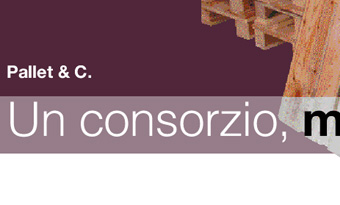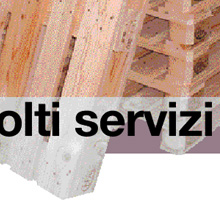





|
|

LEGNO SUGHERO Uso di marchi e iniziative promozionali riguardanti gli imballaggi, i tappi e le palette: per gestire queste attività il Consorzio Servizi Legno-Sughero (Federlegno-Arredo) si è dato una struttura flessibile, articolata in 4 comitati tecnici.
Al servizio degli operatori.
Nel campo degli imballaggi e dei pallet di legno e di sughero si vanno moltiplicando iniziative, legislative e industriali, che generano nuove esigenze di gestione.
Molti gli argomenti sulla breccia - sughero, rintracciabilità dei prodotti, direttive fitosanitarie per gli imballaggi di legno e altro ancora - e di complessa amministrazione, in particolare quando interessano attività promozionali e legate alla concessione d'uso di marchi. È materia del Consorzio Servizi Legno-Sughero di Federlegno-Arredo, che per assolvere con efficacia ai propri compiti ha rivisto la struttura all’insegna della flessibilità. Fatto salvo il ruolo di coordinamento, che rimane responsabilità del livello centrale, oggi infatti il consorzio delega le concessioni d'uso e l'uso diretto di marchi, o altre attività mirate, a quattro comitati tecnici istituiti ad hoc, denominati Epal (pallet di legno), Fitok (norme fitosanitarie), Sughero (imballaggi e tappi) e Riparatori Italiani di Qualità (pallet). Ecco due grandi aree applicative di particolare rilievo.
Crescono le esigenze di qualità
Se il parco pallet EUR-Epal costituisce una risposta evoluta ai problemi del traffico merci, allo stesso tempo richiede un controllo qualitativo accurato, anche per evitare possibili frodi a livello internazionale (i casi di contraffazione sono numerosi). Per questa ragione Assolegno ha rafforzato la propria azione attraverso il Comitato Tecnico Epal del Consorzio Servizi Legno-Sughero. In caso di segnalazione, gli ispettori incaricati dal Consorzio (in Italia, appartengono alla società di controllo SGS) denunciano i casi sospetti alle forze di polizia; lo stesso Consorzio, inoltre, agisce attraverso uno studio legale incaricato di tutelare i marchi EUR-Epal, garantendo che i tribunali competenti fissino i processi relativi ad azioni svolte nel 2002-2003 e costituendosi parte civile.
La tutela del marchio, infatti, rappresenta un tassello fondamentale della qualità Epal ed è tanto più importante nel momento in cui cresce in misura esponenziale il numero dei fabbricanti e riparatori che aderiscono al sistema. Dotato di una nuova sigla di qualità, il pallet EUR certificato Epal è affidabile oltre i confini e rappresenta, per gli utilizzatori, una sicurezza sul piano finanziario (ovvero di veloce ritorno dell’investimento) e operativo garantendo un trasporto senza problemi e la relativa integrità delle merci, uno stoccaggio sicuro, la preservazione del valore delle merci, la protezione dell’ambiente di lavoro.
Le normative fitosanitarie
L’esigenza della marchiatura internazionale IPPC/FAO è nata dalla necessità di uniformare le misure fitosanitarie introdotte da numerosi governi per limitare il rischio di diffusione di organismi nocivi eventualmente associati agli imballaggi di legno.
Pallet, casse, gabbie o materiale da stivaggio accompagnano l’80% circa di tutte le spedizioni transnazionali; si è quindi reso necessario proteggere le foreste da organismi nocivi originari di altri continenti, riducendo al contempo gli ostacoli al libero commercio che sarebbero emersi con l’introduzione di misure diverse da Stato a Stato. A tal fine l’IPPC, la Convenzione Internazionale per la Protezione dei Vegetali (struttura della FAO riconosciuta dal WTO) ha elaborato l’ISPM-15, standard internazionale contenente le linee guida per la regolamentazione degli imballaggi di legno nel commercio internazionale.
L’ISPM-15 prevede che gli imballaggi di legno grezzo siano sottoposti a un trattamento fitosanitario e, successivamente, siano resi riconoscibili attraverso l’apposizione del marchio internazionale IPPC/FAO.
A livello italiano, a partire dallo scorso luglio, il Comitato Tecnico Fitok del Consorzio Servizi Legno-Sughero è stato riconosciuto dal Ministero delle Politiche Agricole e Forestali come soggetto gestore per l’applicazione sul territorio nazionale della normativa ISPM-15.
Supportato da Confartigianato Legno Arredo, Federlegno-Arredo, Fnala/CNA, Unital-Confapi e I.F.A., questo organismo offre informazioni, approfondimenti e consulenze riguardo a tutte le problematiche che nascono dall’applicazione di queste norme.
Sul sito (www.fitok.it), in particolare, si danno informazioni sulle misure da adottare, anche per l’esportazione nelle varie parti del mondo, oltre che sui regolamenti per l’utilizzo del Marchio Fitosaniario Volontario Fitok. On line anche le imprese di fumigazione e produttori di impianti di trattamento termico.
|
 |

Pallet & C.
One consortium, many services
WOOD CORK - The use of brands and promotional undertakings for packaging, corks and pallets: to administer these activities the Wood-Cork Service Consortium (Federlegno-Arredo) has provided itself with a flexible tool, divided up into 4 technical committees.
At the service of the operators.
The multiplication of industrial and legislative undertakings in the wood packaging, pallet and cork field are generating new managerial needs. Many subjects are being broached - that of cork, product retraceability, phytosanitary directives for wood packaging and yet more - which are complex to administrate, in particular when they concern promotional activities associated with the concession of use of brands. This is the subject matter of the Wood-Cork Service Consortium that comes under Federlegno-Arredo, that to effectively carry out its tasks has overhauled its structure, making it more flexible. Apart from its coordinative role, that by definition gives it a central position, today in fact the consortium delegates the concession for the indirect and direct use of brands, or other targeted activities, to four specially set-up technical committees, under the names of Epal (wood pallets), Fitok (phytosanitary standards), Cork (packaging and tops) and Quality Italian repairers (pallets). Here follow two large applicative areas of particular importance.
The demands for quality grow
If the EUR-Epal pallet yard constitutes an evolved response to the problems of the traffic of goods, at the same time it requires a painstaking control on quality, this also so as to avoid possible fraud at international level (there have been numerous cases of counterfeiting). This is why Assolegno has reinforced its action through the Epal Technical Committee of the Cork-Wood Service Consortium. In the event of a complaint, the inspectors assigned the task by the Consortium (In Italy they belong to the control company SGS) denounce the suspect cases to the police; the selfsame Consortium as well acts through a law firm that has been given the responsibility of protecting EUR-Epal brands, guaranteeing that the competent tribunals organize the trials covering the actions carried out in 2002- 2003, suing offenders for damages on behalf of the consortium.
The brand protection is in fact a fundamental feature of Epal quality and it is all the more important in the moment in which the number of manufacturers and repairers that are joining the system shoot up. Now bearing a new quality code, the Epal certified EUR pallet can be relied upon beyond the country’s borders and for the users is a sure thing financially (offering a speedy return on investment) as well as operationally, guaranteeing trouble-free transport, protection of product, safe storage, safeguarding of the value of the goods, protection the work environment.
Phytosanitary standards
The demand for IPPC/FAO international branding was born out of the need to uniform the phytosanitary demands introduced by the numerous governments to limit the risk of the spread of harmful organisms that could be attributable to wood packaging. Pallets, crates, cages for stowage accompany around 80% of all transnational shipments; hence the need to protect the forests from harmful organisms originating from other continents, at the same time reducing the obstacles to free trade that would have emerged with the introduction of measures that differ from state to state. To this end IPPC, the national convention for the Protection of Vegetables (structure of the FAO recognised by the WTO) has devised the ISPM-15, the international standard containing the guidelines for regulating wood packaging in international trade. ISPM-15 lays down that packaging from raw wood should undergo a phytosanitary treatment and following that be made recognisable by the application of an international IPPC/FAO brand.
At Italian level, starting from last July, the Fitok Technical Committee of the Wood-Cork Service Consortium was recognised by the Minister for Agricultural and Forestry policies as the administrator for the application nationwide of the ISPM-15 standard. Backed up by Confartigianato Legno Arredo, Federlegno-Arredo, Fnala/CNA, Unital-Confapi and I.F.A., this organism offers information, studies and consultancy on all problems that emerge from the application of these standards. On its website (www.fitok.it), in particular, they give information on the measures to be adopted, also for exporting to various parts of the world, as well as rulings for the use of the Fitok Voluntary Phytosanitary brand.
The fumigation concerns and producers of thermal processing systems are also on line.
|